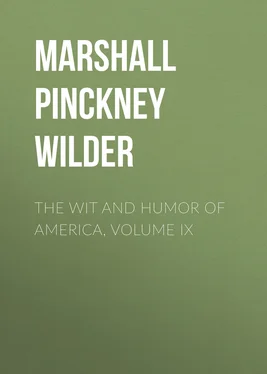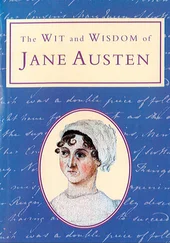Marshall Pinckney Wilder - The Wit and Humor of America, Volume IX
Здесь есть возможность читать онлайн «Marshall Pinckney Wilder - The Wit and Humor of America, Volume IX» — ознакомительный отрывок электронной книги совершенно бесплатно, а после прочтения отрывка купить полную версию. В некоторых случаях можно слушать аудио, скачать через торрент в формате fb2 и присутствует краткое содержание. Жанр: foreign_humor, Юмористические книги, foreign_detective, на английском языке. Описание произведения, (предисловие) а так же отзывы посетителей доступны на портале библиотеки ЛибКат.
- Название:The Wit and Humor of America, Volume IX
- Автор:
- Жанр:
- Год:неизвестен
- ISBN:нет данных
- Рейтинг книги:3 / 5. Голосов: 1
-
Избранное:Добавить в избранное
- Отзывы:
-
Ваша оценка:
- 60
- 1
- 2
- 3
- 4
- 5
The Wit and Humor of America, Volume IX: краткое содержание, описание и аннотация
Предлагаем к чтению аннотацию, описание, краткое содержание или предисловие (зависит от того, что написал сам автор книги «The Wit and Humor of America, Volume IX»). Если вы не нашли необходимую информацию о книге — напишите в комментариях, мы постараемся отыскать её.
The Wit and Humor of America, Volume IX — читать онлайн ознакомительный отрывок
Ниже представлен текст книги, разбитый по страницам. Система сохранения места последней прочитанной страницы, позволяет с удобством читать онлайн бесплатно книгу «The Wit and Humor of America, Volume IX», без необходимости каждый раз заново искать на чём Вы остановились. Поставьте закладку, и сможете в любой момент перейти на страницу, на которой закончили чтение.
Интервал:
Закладка:
The Wit and Humor of America, Volume IX (of X)
THE NINE LITTLE GOBLINS
They all climbed up on a high board-fence—
Nine little Goblins, with green-glass eyes—
Nine little Goblins that had no sense,
And couldn't tell coppers from cold mince pies;
And they all climbed up on the fence, and sat—
And I asked them what they were staring at.
And the first one said, as he scratched his head
With a queer little arm that reached out of his ear
And rasped its claws in his hair so red—
"This is what this little arm is fer!"
And he scratched and stared, and the next one said
"How on earth do you scratch your head?"
And he laughed like the screech of a rusty hinge—
Laughed and laughed till his face grew black;
And when he choked, with a final twinge
Of his stifling laughter, he thumped his back
With a fist that grew on the end of his tail
Till the breath came back to his lips so pale.
And the third little Goblin leered round at me—
And there were no lids on his eyes at all—
And he clucked one eye, and he says, says he,
"What is the style of your socks this fall?"
And he clapped his heels—and I sighed to see
That he had hands where his feet should be.
Then a bald-faced Goblin, gray and grim,
Bowed his head, and I saw him slip
His eyebrows off, as I looked at him,
And paste them over his upper lip;
And then he moaned in remorseful pain—
"Would—Ah, would I'd me brows again!"
And then the whole of the Goblin band
Rocked on the fence-top to and fro,
And clung, in a long row, hand in hand,
Singing the songs that they used to know—
Singing the songs that their grandsires sung
In the goo-goo days of the Goblin-tongue.
And ever they kept their green-glass eyes
Fixed on me with a stony stare—
Till my own grew glazed with a dread surmise,
And my hat whooped up on my lifted hair,
And I felt the heart in my breast snap to
As you've heard the lid of a snuff-box do.
And they sang, "You're asleep! There is no board-fence,
And never a Goblin with green-glass eyes!—
'Tis only a vision the mind invents
After a supper of cold mince-pies,—
And you're doomed to dream this way," they said,—
" And you sha'n't wake up till you're clean plum dead! "
OUR VERY WISHES
It was natural that it should be quiet for Mrs. Cairnes in her empty house. Once there had been such a family of brothers and sisters there! But one by one they had married, or died, and at any rate had drifted out of the house, so that she was quite alone with her work, and her memories, and the echoes in her vacant rooms. She hadn't a great deal of work; her memories were not pleasant; and the echoes were no pleasanter. Her house was as comfortable otherwise as one could wish; in the very centre of the village it was, too, so that no one could go to church, or to shop, or to call, unless Mrs. Cairnes was aware of the fact, if she chose; and the only thing that protected the neighbors from this supervision was Mrs. Cairnes's mortal dread of the sun on her carpet; for the sun lay in that bay-windowed corner nearly all the day, and even though she filled the window full of geraniums and vines and calla-lilies she could not quite shut it out, till she resorted to sweeping inner curtains.
Mrs. Cairnes did her own work, because, as she said, then she knew it was done. She had refused the company of various individuals, because, as she said again, she wouldn't give them house-room. Perhaps it was for the same reason that she had refused several offers of marriage; although the only reason that she gave was that one was quite enough, and she didn't want any boots bringing in mud for her to wipe up. But the fact was that Captain Cairnes had been a mistake; and his relict never allowed herself to dwell upon the fact of her loss, but she felt herself obliged to say with too much feeling that all was for the best; and she dared not risk the experiment again.
Mrs. Cairnes, however, might have been lonelier if she had been very much at home; but she was President of the First Charitable, and Secretary of the Second, and belonged to a reading-club, and a sewing-circle, and a bible-class, and had every case of illness in town more or less to oversee, and the circulation of the news to attend to, and so she was away from home a good deal, and took many teas out. Some people thought that if she hadn't to feed her cat she never would go home. But the cat was all she had, she used to say, and nobody knew the comfort it was to her. Yet, for all this, there were hours and seasons when, obliged to stay in the house, it was intolerably dreary there, and she longed for companionship. "Some one with an interest," she said. "Some one who loves the same things that I do, who cares for me, and for my pursuits. Some one like Sophia Maybury. Oh! how I should have liked to spend my last days with Sophia! What keeps Dr. Maybury alive so, I can't imagine. If he had only—gone to his rest"—said the good woman, "Sophia and I could join our forces and live together in clover. And how we should enjoy it! We could talk together, read together, sew together. No more long, dull evenings and lonely nights listening to the mice. But a friend, a dear sister, constantly at hand! Sophia was the gentlest young woman, the prettiest,—oh, how I loved her in those days! She was a part of my youth. I love her just as much now. I wish she could come and live here. She might, if there weren't any Dr. Maybury. I can't stand this solitude. Why did fate make me such a social old body, and then set me here all alone?"
If Sophia was the prettiest young woman in those days, she was an exceedingly pretty old woman in these, with her fresh face and her bright eyes, and if her hair was not all her own, she had companions in bangs. Dr. Maybury made a darling of her all his lifetime, and when he died he left her what he had; not much,—the rent of the Webster House,—but enough.
But there had always been a pea-hen in Mrs. Maybury's lot. It was all very well to have an adoring husband,—but to have no home! The Doctor had insisted for years upon living in the tavern, which he owned, and if there was one thing that his wife detested more than another, it was life in a tavern. The strange faces, the strange voices, the going and coming, the dreary halls, the soiled table-cloths, the thick crockery, the damp napkins, the flies, the tiresome menu —every roast tasting of every other, no gravy to any,—the all out-doors feeling of the whole business, your affairs in everybody's mouth, the banging doors, the restless feet, the stamping of horses in the not distant stable, the pandemonium of it all! She tried to make a little home in the corner of it; but it was useless. And when one day Dr. Maybury suddenly died, missing him and mourning him, and half distracted as she was, a thrill shot across the darkness for half a thought,—now at any rate she could have a home of her own! But presently she saw the folly of the thought,—a home without a husband! She staid on at the tavern, and took no pleasure in life.
But with Dr. Maybury's departure, the thought recurred again and again to Mrs. Cairnes of her and Sophia's old dream of living together. "We used to say, when we were girls, that we should keep house together, for neither of us would ever marry. And it's a great, great pity we did! I dare say, though, she's been very happy. I know she has, in fact. But then if she hadn't been so happy with him, she wouldn't be so unhappy without him. So it evens up. Well, it's half a century gone; but perhaps she'll remember it. I should like to have her come here. I never could bear Dr. Maybury, it's true; but then I could avoid the subject with her. I mean to try. What a sweet, comfortable, peaceful time we should have of it!"
Читать дальшеИнтервал:
Закладка:
Похожие книги на «The Wit and Humor of America, Volume IX»
Представляем Вашему вниманию похожие книги на «The Wit and Humor of America, Volume IX» списком для выбора. Мы отобрали схожую по названию и смыслу литературу в надежде предоставить читателям больше вариантов отыскать новые, интересные, ещё непрочитанные произведения.
Обсуждение, отзывы о книге «The Wit and Humor of America, Volume IX» и просто собственные мнения читателей. Оставьте ваши комментарии, напишите, что Вы думаете о произведении, его смысле или главных героях. Укажите что конкретно понравилось, а что нет, и почему Вы так считаете.












